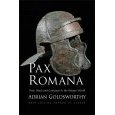

 | Pax Romana War, peace and conquest in the Roman
World Published by: |
 | Pax Romana War, peace and conquest in the Roman
World Published by: |
From the jacket -
"The Pax Romana provided a remarkable period of peace and stability, rarely seen before or since. Yet the Romans were first and foremost conquerors, imperialists who took by force a vast empire stretching from the Euphrates in the east to the Atlantic coast in the west. Their peace meant Roman victory and was brought about by strength and dominance rather than co-existence with neighbours. The Romans were aggressive and ruthless, and during the creation of their empire millions died or were enslaved.

But the Pax Romana was real, not merely the boast of emperors, and some of the regions in the Empire have never again lived for so many generations free from major wars. So what exactly was the Pax Romana and what did it mean for the people who found themselves brought under Roman rule?
Acclaimed historian Adrian Goldsworthy tells the story of the creation of the Empire, revealing how and why the Romans came to control so much of the world and asking whether the favourable image of the Roman peace is a true one. He chronicles the many rebellions by the conquered, and describes why these broke out and why most failed. At the same time, he explains that hostility was only one reaction to the arrival of Rome, and from the start there was alliance, collaboration and even enthusiasm for joining the invaders, all of which increased as resistance movements faded away.
A ground-breaking and comprehensive history of the Roman Peace, Pax Romana takes the reader on a journey from the bloody conquests of an aggressive Republic through the age of Caesar and Augustus to the golden age of peace and prosperity under diligent emperors like Marcus Aurelius, offering a balanced and nuanced reappraisal of life in the Roman Empire."
A couple of questions and answers from the Yale University Press catalogue:-
Why this book?
Peace is always a rare and precious thing and this makes the "Roman Peace" all the more remarkable, and I wanted to understand how it came about. I wanted also to understand what the Roman Empire meant to the people who lived in it. What was it like for the other peoples in the ancient world who found themselves living next to the Roman Empire, or were incorporated into it, whether by force or choice? It is simplistic to demonize empires-just as it once was to celebrate them uncritically-and there is a danger of turning conquered peoples into passive and virtuous victims of imperialist aggression. The truth is more complicated, and looking at Roman power from the viewpoint of Romans and outsiders provides many relevant insights to our own world.
But wasn't "Pax Romana" the peace imposed by the victors, whose conceit was that they were bringing civilization to barbarians?
The Romans fought a lot of wars, and never granted other peoples equal status. Other kingdoms and states were either allies or real or potential enemies. Peace made Rome and its allies safe. Only once they were well on their way to establishing a large and permanent empire did the Romans begin to talk of a duty to bring peace, order, and the rule of law to a wider world. This was not achieved solely or even primarily by force. People wanted to be Roman. Peace became a reality, even if imperfect.
